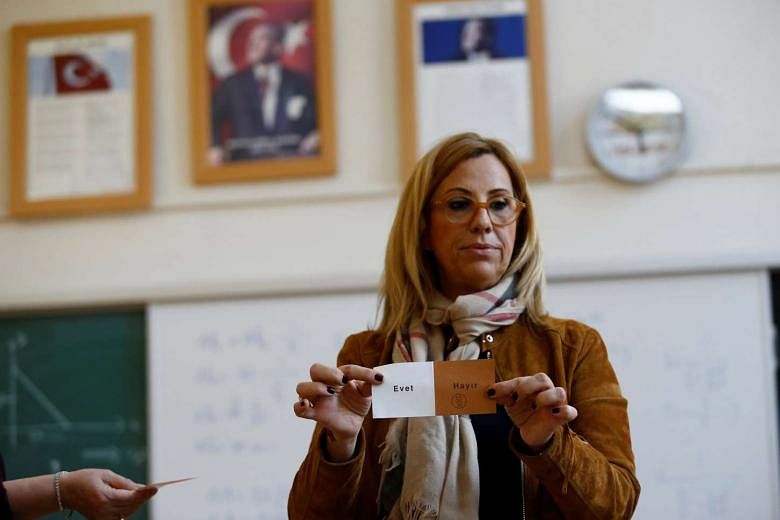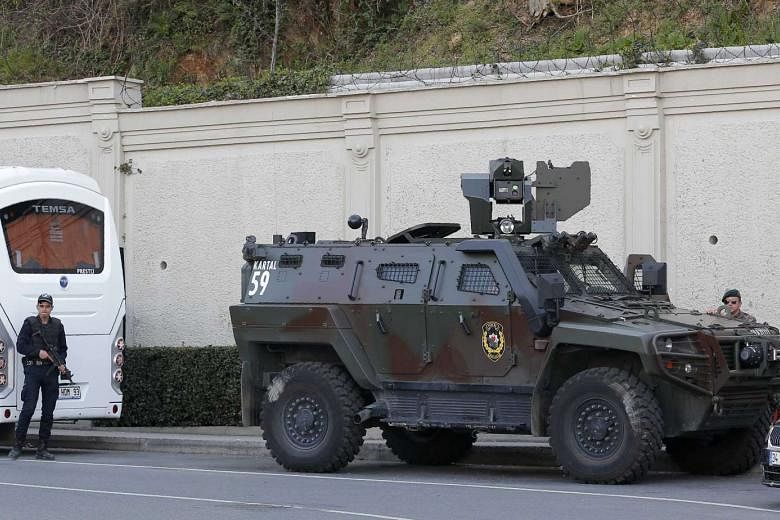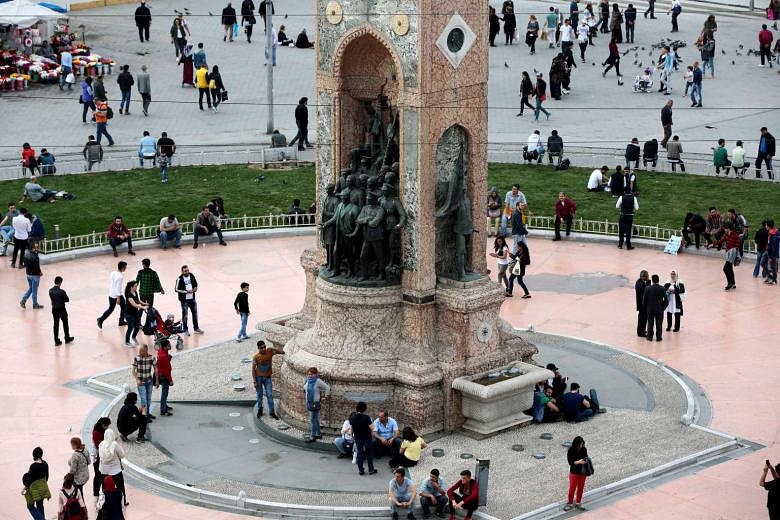ISTANBUL (NYTIMES) - A slim majority of Turkish voters agreed to grant sweeping powers to their president, in a watershed moment that the country's opposition fears may cement a system of authoritarian rule within one of the critical power brokers of the Middle East.
With nearly 99 per cent of votes in a referendum counted on Sunday night (April 16), supporters of the proposal had 51.3 per cent of votes cast, and opponents had 48.7 per cent, the country's electoral commission announced.
The result will take days to confirm, and the main opposition party said it would demand a recount of about 37 per cent of ballot boxes, containing around 2.5 million votes.
But on Sunday night, the result was already a political reality, as President Recep Tayyip Erdogan hailed his victory in front of a crowd of supporters in Istanbul. "We are enacting the most important governmental reform of our history," he said.
The constitutional change will allow the winner of the 2019 presidential election to assume full control of the government, ending the current parliamentary political system.
The ramifications, however, are immediate. The "yes" vote in the referendum is a validation of the current leadership style of Erdogan, who has been acting as a de facto head of government since his election in 2014 despite having no constitutional right to wield such power. The office of Turkey's president was meant to be an impartial role without full executive authority.
The result tightens Erdogan's grip on the country, which is one of the leading external actors in the Syrian civil war, a major way station along the migration routes to Europe and a crucial Middle Eastern partner of the United States and Russia.
Many analysts were surprised by the close result, saying they had expected Erdogan to achieve a larger majority because he had held the referendum within an atmosphere of fear.
-
What 'yes' vote would mean
-
MORE POWERS FOR PRESIDENT ERDOGAN
Under the new Constitution, the Turkish President would have strengthened executive powers to directly appoint top public officials, including ministers.
The President would also be able to assign one or several vice-presidents. The office and position of prime minister would be scrapped.
The changes would implement a shake-up in the judiciary. The President and Parliament would together be able to choose four members of the Supreme Board of Judges and Prosecutors, a key judicial council that appoints and removes personnel in the judiciary. Parliament would choose seven members on its own in what would be renamed the Board of Judges and Prosecutors.
PEACE PROCESS OR MILITARY ACTION?
Mr Erdogan could adopt a more reconciliatory attitude on the country's problem with Kurdish militants, even to the point of reopening dialogue. But the Yeni Safak daily has claimed that the government will open a new front with cross-border operations against PKK camps in Sinjar, northern Iraq, in a new effort to destroy the group.
Under the proposed Constitution, a state of emergency imposed by the President would also last six months - as opposed to three now - and could then be extended for four months at a time.
ERDOGAN IN POWER TILL 2029?
The proposed Constitution states that the next presidential and parliamentary elections are to be held simultaneously on Nov 3, 2019. If he wins, the President would have a five-year term with a maximum of two mandates. So the changes would mean that Mr Erdogan could stay in power for another two terms until 2029.
INTERNATIONAL IMPLICATIONS
The outcome will shape Turkey's strained relations with the European Union. The Nato member state has curbed the flow of refugees from Syria and Iraq into the bloc, but Mr Erdogan has said he may review the deal after the vote.
Mr Erdogan has also said Turkey's bid for EU membership would be "on the table" after the referendum, and in every single campaign speech said he would sign any Bill restoring capital punishment, a move that would automatically end its bid to join the bloc.
In the event of an easy victory, Mr Erdogan could have the confidence to take a decisive move away from EU integration and show Turkey can forge alternative strategic alliances. One alternative to full membership could be a strengthened Customs union, but it is unclear if that would be palatable for Mr Erdogan.
AGENCE FRANCE-PRESSE, REUTERS
Since a failed coup last summer, Turkey has been under a state of emergency, a situation that allowed the government to fire or suspend about 130,000 people suspected of being connected to the failed putsch, and to arrest about 45,000.
The campaign itself was characterised by prolonged intimidation of opposition members, several of whom were shot at or beaten while on the stump by persons unknown.
The opposition questioned the legitimacy of the referendum after the election board made a last-minute decision to increase the burden needed to prove accusations of ballot-box stuffing. At least three instances of alleged voter fraud appeared to be captured on camera.
"We are receiving thousands of complaints on election fraud," said Erdal Aksunger, deputy head of the main opposition party, the Republican People's Party, known as the CHP. "We are evaluating them one by one."
The new system will, among other changes:
- Abolish the post of prime minister and transfer executive power to the president.
- Allow the newly empowered president to issue decrees and appoint many judges and officials responsible for scrutinising his decisions.
- Limit the president to two five-year terms, but give the option of running for a third term if Parliament truncates the second one by calling for early elections.
- Allow the president to order disciplinary inquiries into any of Turkey's 3.5 million civil servants, according to an analysis by the head of the Turkish Bar Association.
Academics and members of the opposition are concerned that the new system will threaten the separation of powers on which liberal democracies have traditionally depended.
"It represents a remarkable aggrandisement of Erdogan's personal power and quite possibly a death blow to vital checks and balances in the country," said professor Howard Eissenstat, a Turkey expert at the Project on Middle East Democracy, a Washington research group. "Judicial independence was already shockingly weak before the referendum; the new system makes that worse."
Erdogan's supporters deny that the new system will limit political and judicial oversight. If opposition parties win control of Parliament, they could override the president's decrees with their own legislation, while also asserting greater control over judicial appointments, supporters of the new constitution contend.
The victorious "yes" camp also argues that a strong, centralised government will make Turkey better able to tackle its many challenges, including a troubled economy, the world's largest population of Syrian refugees, two terrorism campaigns, a civil war against Kurdish insurgents and the Syrian war across Turkey's southern border.
"A new page opens in our history of democracy with this vote," Prime Minister Binali Yildirim, an Erdogan loyalist, said in a victory speech on Sunday night. "Be sure, everyone, we will use this result as best as we can - for the wealth and peace of our people."
The fearful environment in which the referendum campaign was held has led watchdogs to question its fairness. In addition to the vast purges of perceived opposition members, authorities also often prevented "no" campaigners from holding rallies and events.
And Erdogan and his supporters often implied that their opponents were allied with terrorist groups or those suspected of plotting last year's failed coup.
The result revealed a deeply divided country, nearly half of which now feels highly embittered. "I am incredibly sad right now," said Yesim Kara, 37, a "no" voter in Istanbul. "Dark days are ahead."
Erdogan's victory "will enhance the stability of the government, but it will weaken social stability," said Ozgur Unluhisarcikli, director of the Ankara office of the German Marshall Fund of the United States, a research group. "The new social contract that is being built in Turkey is being based on a very weak foundation," he added.
Few could agree about how Erdogan would respond, and he offered no conclusive clues in his victory speech. In one breath, he appeared to reach out to his opponents, calling the results the "victory of everyone who said yes and no. But in the next, he promised to reinstate the death penalty - which would end any hopes that Turkey will join the European Union - and mocked his opponents' intent to appeal the result.
"Don't beat the air," he said. "It is too late now."







